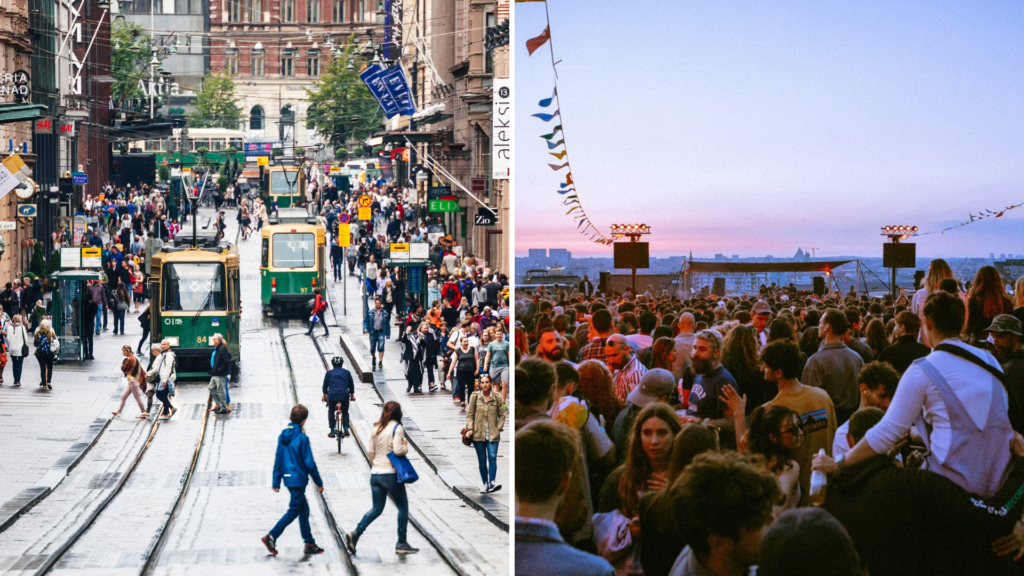When it comes to the happiest population in the world, Belgium ranked one place higher than last year. Finland was named the country with the happiest population in the world for the seventh time in a row.
The latest World Happiness Report, published by research firm Gallup on the occasion of International Happiness Day (20 March), ranked Belgium in 16th place when it comes to happiness. The results once again highlighted how Northern Europeans are the happiest: Denmark, Finland, Iceland, Norway and Sweden were all included in the top ten.
In the UN-sponsored report, Finland reaffirmed its position as the happiest country in the world, winning the title for the seventh year running. While experts didn't explain why Finns are happier than citizens in all other countries, other studies have hinted that social support, income, freedom and no corruption are some key factors that contribute to their life satisfaction. Proximity to nature and a good work-life balance also play a major role.
A more realistic understanding of what a successful life is could also impact the score. For example, in the United States and other Western countries, success and happiness are often associated with financial gain, and not attaining this goal can lead to unhappiness.
However, social and political factors such as freedom and corruption also play a role, which is evident when looking at the other end of the scale. In last place was Afghanistan, which is currently in the grip of a repressive, theocratic dictatorship after the Taliban returned to power in 2020.
Changing top 20
While the abstract and relative nature of happiness is difficult to define statistically, the report's researchers attempted to analyse the concept by assessing people's happiness across 143 countries, as well as economic and social data over a total of six factors: social support, income, health, freedom, generosity and the absence of corruption.
"The biggest change this year is within the top 20," the researchers wrote. For the first time in more than ten years, the United States and Germany were not ranked among the 20 happiest nations, instead coming in 23rd and 24th place, while Costa Rica and Kuwait entered the ranking of top countries in 12th and 13th place.
The convergence between the two halves of Europe also continued, with Czechia, Lithuania and Slovenia landing in 18th, 19th and 21st place. Remarkably, none of the world's most populous countries feature in the top 20.
Generational divide
Researchers also stressed that the difference in happiness between generations in different countries is notable. This year marked the first time the report distinguished between age groups.
Overall, there is a stronger sense of happiness among the younger generations than the older ones, although by less now than in the 2006-2010 period. This is also not the case in all regions. Especially in Western Europe, life evaluations among the young are significantly lower in 2021-2023 than they were in 2006-2010.
In Denmark, Finland, Norway and Sweden, the Netherlands and Canada, the older generations are the happiest and younger people the unhappiest. Researchers suspect this is because they are exposed to distressing news online that makes them unhappy. The ability to share this content around faster online may also make them and those around them unhappier.
Meanwhile, in Belgium, people aged 30 to 40 are the happiest and older people are the unhappiest. For under-30s, Belgium drops to 24th place, while for people aged 40 to 60, it ranked in 13th place.
Related News
- What are the world’s most (and least) powerful passports in 2024?
- Belgium ranked third most stressful country in the world to live in
In North America, the rankings for those aged 60 and over are 50 or more places higher than for those under 30. In contrast, in Central and Eastern Europe, many rankings are more than 40 places higher for the young than for the old.
Worryingly, the inequality of happiness, as measured by the standard deviation of life evaluations within an age group, increased in every region, except in Western Europe, where increases in inequality among the old were offset by a drop in young people.
Find the top 20 happiest countries in the world in 2024 below:
- Finland
- Denmark
- Iceland
- Sweden
- Israel
- Netherlands
- Norway
- Luxembourg
- Switzerland
- Australia
- New Zealand
- Costa Rica
- Kuwait
- Austria
- Canada
- Belgium
- Ireland
- Czechia
- Lithuania
- United Kingdom

